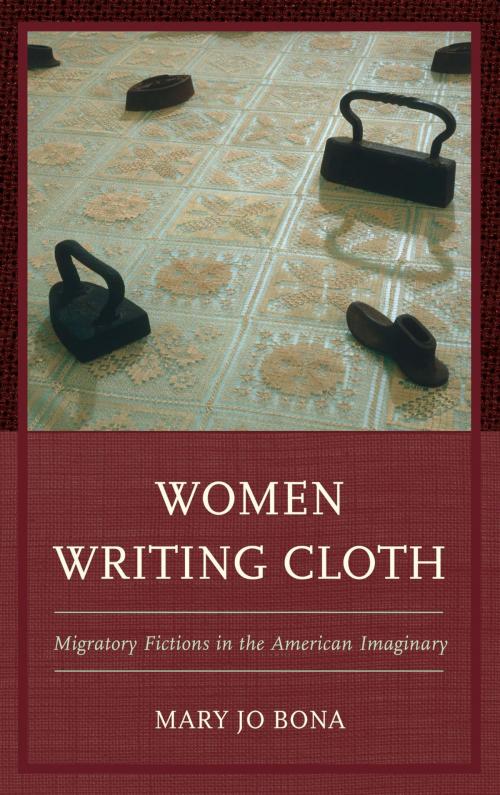Women Writing Cloth
Migratory Fictions in the American Imaginary
Fiction & Literature, Literary Theory & Criticism, Feminist Criticism, Nonfiction, Home & Garden, Crafts & Hobbies, Needlecrafts & Fabric, Sewing, American| Author: | Mary Jo Bona | ISBN: | 9781498525862 |
| Publisher: | Lexington Books | Publication: | December 9, 2015 |
| Imprint: | Lexington Books | Language: | English |
| Author: | Mary Jo Bona |
| ISBN: | 9781498525862 |
| Publisher: | Lexington Books |
| Publication: | December 9, 2015 |
| Imprint: | Lexington Books |
| Language: | English |
Women Writing Cloth: Migratory Fictions in the American Imaginary performs a ground-breaking intervention by uncovering the relationship between literary cloth-working women and migration in a range of American novels across centuries. Bona demonstrates how four authors, Nathaniel Hawthorne, Alice Walker, Sandra Cisneros, and Adria Bernardi, innovate on pre-modern stories of weaving women in order to explore the intricate connections between handwork, resourcefulness, and mobility. Refracted through the lens of women’s migratory experiences vis-à-vis cloth-working aesthetics, Women Writing Cloth examines varied aspects of sewing—embroidering, quilting, and rebozo-making—as textual signifiers of mobility and preservation. Through authorial innovation,women’s handwork constitutes a revolt against a devaluation of cultural heritage and a distrust of the self.
Women Writing Cloth argues that literary, cloth-working women inspire paradigmatic shifts in social codes due to portable skills that enabled their survival in the new world. Bona paints a complex picture of women whose migratory experiences taught them how to live within a stigmatizing culture and beneath institutional powers to control their artistry. Fabric designs assume fuller multicultural meaning when textiles cross borders and tell unspeakable stories that expose constraints typifying gender, race, and heritage. The authors examined simulate the artistic creativity of cloth-work by interrogating traditional assumptions about representation, chronology, and spatial boundaries. Women Writing Cloth breaks new ground to reveal the elaborate relationship between cloth-work expertise and women’s mobility. Variations of cloth-working women showcase a relationship between subversive artistry and institutional oppressions that compel strategies of resistance, enable survival, and, inspired by migration, construct inventive fabric creations. Women Writing Cloth engages the activity of cloth work as a means of reclamation and subversive expression represented in American literature.
Women Writing Cloth: Migratory Fictions in the American Imaginary performs a ground-breaking intervention by uncovering the relationship between literary cloth-working women and migration in a range of American novels across centuries. Bona demonstrates how four authors, Nathaniel Hawthorne, Alice Walker, Sandra Cisneros, and Adria Bernardi, innovate on pre-modern stories of weaving women in order to explore the intricate connections between handwork, resourcefulness, and mobility. Refracted through the lens of women’s migratory experiences vis-à-vis cloth-working aesthetics, Women Writing Cloth examines varied aspects of sewing—embroidering, quilting, and rebozo-making—as textual signifiers of mobility and preservation. Through authorial innovation,women’s handwork constitutes a revolt against a devaluation of cultural heritage and a distrust of the self.
Women Writing Cloth argues that literary, cloth-working women inspire paradigmatic shifts in social codes due to portable skills that enabled their survival in the new world. Bona paints a complex picture of women whose migratory experiences taught them how to live within a stigmatizing culture and beneath institutional powers to control their artistry. Fabric designs assume fuller multicultural meaning when textiles cross borders and tell unspeakable stories that expose constraints typifying gender, race, and heritage. The authors examined simulate the artistic creativity of cloth-work by interrogating traditional assumptions about representation, chronology, and spatial boundaries. Women Writing Cloth breaks new ground to reveal the elaborate relationship between cloth-work expertise and women’s mobility. Variations of cloth-working women showcase a relationship between subversive artistry and institutional oppressions that compel strategies of resistance, enable survival, and, inspired by migration, construct inventive fabric creations. Women Writing Cloth engages the activity of cloth work as a means of reclamation and subversive expression represented in American literature.















